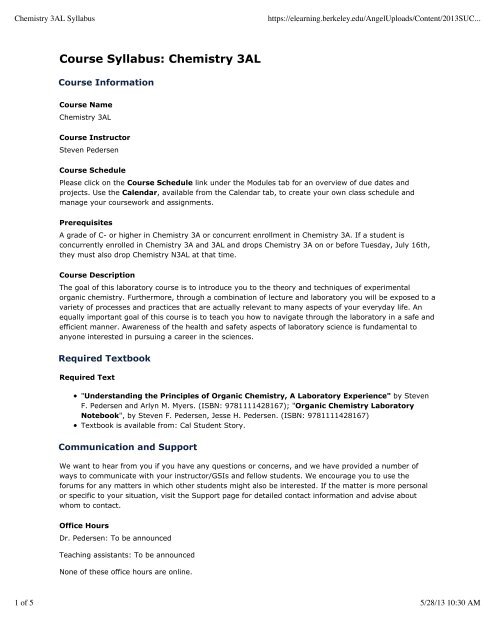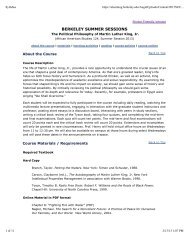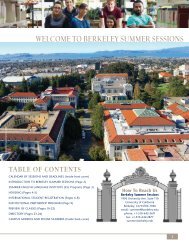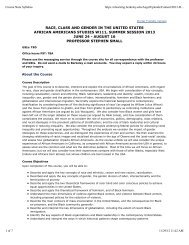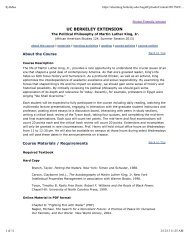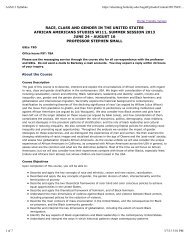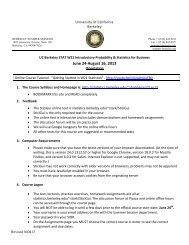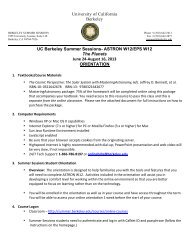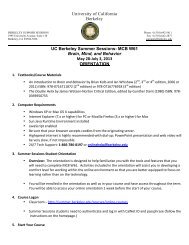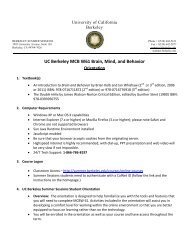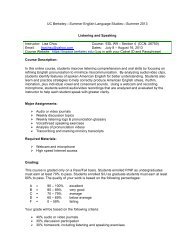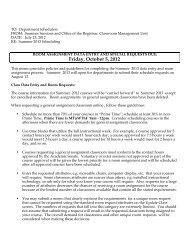Chemistry 3AL Syllabus - Berkeley Summer Sessions
Chemistry 3AL Syllabus - Berkeley Summer Sessions
Chemistry 3AL Syllabus - Berkeley Summer Sessions
Create successful ePaper yourself
Turn your PDF publications into a flip-book with our unique Google optimized e-Paper software.
<strong>Chemistry</strong> <strong>3AL</strong> <strong>Syllabus</strong>https://elearning.berkeley.edu/AngelUploads/Content/2013SUC...Online DiscussionsThere are two online discussion periods during the semester. During these times you will be asked toparticipate in an online discussion relating to a subject posed to your laboratory section by the courseinstructor. These discussions will be related to both the online lectures and what you have been workingon in the laboratory. There is a participation grade for these discussion periods. Depending on the level ofyour meaningful participation you will receive between 1 and 5 points. If you choose not to participate,you will receive 0 points.Lab ExamThere will be one on-campus lab exam on Wednesday, August 13th from 8-9 p.m., location TBA. Thisexam will focus on the information discussed in the online lectures and the material covered in the threeworksheets. The exam is worth 30 points. This exam MUST be taken AND a score of ≥ 10 points must beobtained in order to complete the class. That is, if you score less than 10 points on the exam, you willreceive an incomplete in the class regardless of how many total points you have accumulated. Theincomplete will need to be satisfied within two semesters by taking the lab exam offered in <strong>Chemistry</strong><strong>3AL</strong> in either Fall of 2013 or Spring of 2014. A score of ≥ 10 points will warrant completion of the course.Until the incomplete grade is satisfied, you will not be allowed to take <strong>Chemistry</strong> 3BL. Note: If youalready have three zero's in the course at the time of the lab exam, you do not need to take the labexam as you have already failed the course.GradesThe point total for this course is 155 points. These are broken down as follows:70 points for lab attendance and lab observations30 points for Class Lab Reports15 points for in-lab worksheets10 points for online discussions30 points for the laboratory examGrades at the end of the semester will be assigned as follows:LetterGradeA (includes A andA-)B (includes B+, B andB-)C (includes C+, C andC-)DFPoints 124-155 109-123 93-108 78-92 0-77PoliciesStudents with DisabilitiesWe have provided text transcripts of all of the recorded lessons at the end of each module. The TXT filesare in a zipped folder for download.Any students requiring course accommodations due to a physical, emotional, or learning disability mustcontact the Disabled Students' Program (DSP), http://dsp.berkeley.edu/services.html, at the beginning ofthe course with their request. The DSP will review all requests on an individual basis. Please have yourDisabled Student Program Specialist send the instructor a formal request by email by July 26, 2013.Academic IntegrityCollaboration and Independence: Reviewing lecture and reading materials and studying for examscan be enjoyable and enriching things to do with fellow students. This is recommended. However, unlessotherwise instructed, homework assignments are to be completed independently and materials submitted4 of 5 5/28/13 10:30 AM
<strong>Chemistry</strong> <strong>3AL</strong> <strong>Syllabus</strong>https://elearning.berkeley.edu/AngelUploads/Content/2013SUC...as homework should be the result of one’s own independent work.Cheating: A good lifetime strategy is always to act in such a way that no one would ever imagine thatyou would even consider cheating. Anyone caught cheating on a quiz or exam in this course will receive afailing grade in the course and will also be reported to the University Center for Student Conduct. Inorder to guarantee that you are not suspected of cheating, please keep your eyes on your own materialsand do not converse with others during the quizzes and exams.Plagiarism: To copy text or ideas from another source without appropriate reference is plagiarism andwill result in a failing grade for your assignment and usually further disciplinary action. For additionalinformation on plagiarism and how to avoid it, see, for example:http://www.lib.berkeley.edu/instruct/guides/citations.html#Plagiarismhttp://gsi.berkeley.edu/teachingguide/misconduct/prevent-plag.htmlAcademic Integrity and Ethics: Cheating on exams and plagiarism are two common examples ofdishonest, unethical behavior. Honesty and integrity are of great importance in all facets of life. Theyhelp to build a sense of self-confidence, and are key to building trust within relationships, whetherpersonal or professional. There is no tolerance for dishonesty in the academic world, for it undermineswhat we are dedicated to doing - furthering knowledge for the benefit of humanity.© 2013 UC Regents. All rights reserved.5 of 5 5/28/13 10:30 AM


